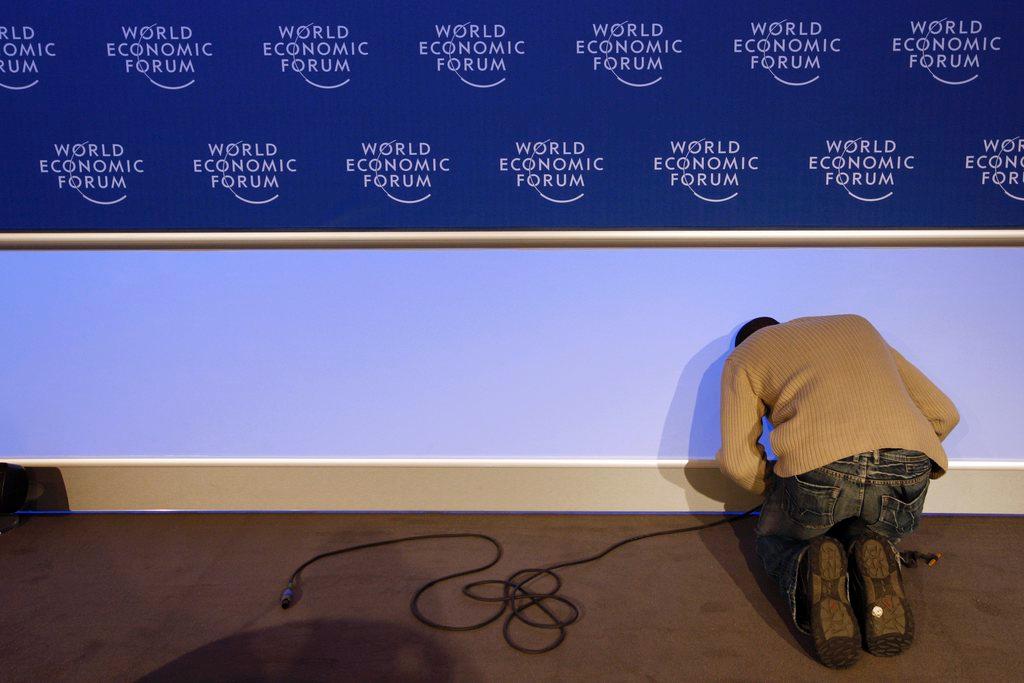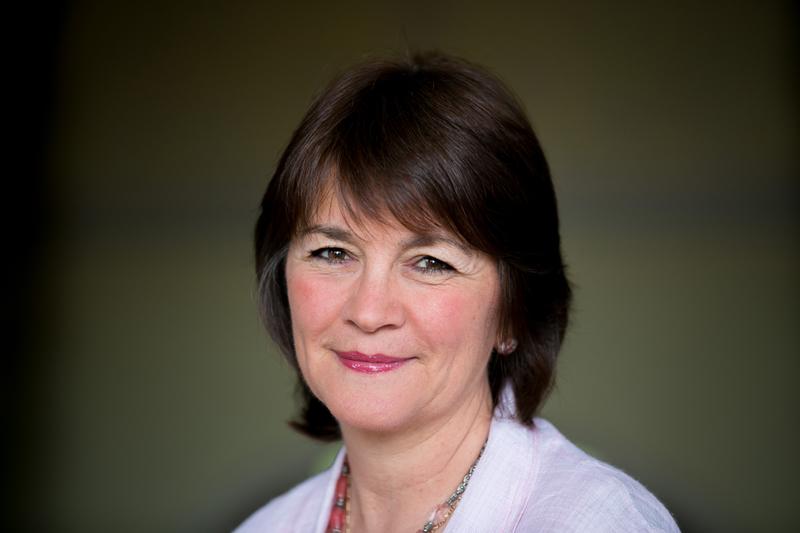
Is WEF really serious about tackling inequalities?

The World Economic ForumExternal link is an appropriate forum for civil society leaders to discuss poverty, inequality and climate change, but its value is limited. That’s the view of social rights campaigner Lesley-Anne Knight.
This year, WEF has once again been forced to defend itself against accusations of being nothing more than a debating club designed for the rich and powerful.
But it also attracts a wide array of NGOs – Oxfam, Amnesty International and the WWF are among those who will be present in Davos for this year’s annual meeting, from January 21-24.
Knight attended WEF four times as head of the Catholic charity Caritas, and is now chief executive of the humanitarian organisation The EldersExternal link, which was formed by Nelson Mandela in 2007.
swissinfo.ch: What does WEF really offer civil society groups and their causes?
Lesley-Anne Knight: I remember agonising over this question every year and I am sure that those who still attend will ask: “Should I go or not?” There is a temptation on the one hand to think: “How can I get out of this?”, but on the other hand to ask: “How can I make the most of that space to raise awareness?”

DavosExternal link is one of the very few places where you have the opportunity to get access to really influential business leaders as well as politicians and civil society organisations. These key three groups are increasingly cooperating and collaborating because we are all interconnected and we all have a part to play in solving social problems. Civil society does not claim to have all the answers – we need each other to find better solutions.
So is WEF the right place to be talking about inequality and poverty when the people there have the sum of the greatest wealth? Yes, this is the place where it must be done.
swissinfo.ch: How do you know that business leaders are not just nodding and saying the right things in public, only to go back on their word later?
L.A.K.: Business leaders know that if they enter a war-torn country for investment reasons they must work closely with civil society if their objectives are to succeed. There is an affinity to finding the best environment for people to thrive. You can also do business and do good.
I think that is a genuine belief even in a place like Davos. I think people are sincerely listening to what civil society has to say. Business leaders and financiers are not just paying lip service to corporate responsibility because it is the right thing to be seen doing.
Quite the contrary, huge contributions are being made by business leaders in the areas of development and humanitarian aid.

More
WEF defends record in fight against inequality
swissinfo.ch: So what results did you see emerge from previous WEF meetings?
L.A.K.: To what extent real change does happen at WEF is really for the organisers to demonstrate probably better than they do now. We can be cynical about this and ask: “After 45 years of Davos what have they substantially brought about by change?” But this is very hard to measure.
Anyone who has been to Davos will come away with contacts who will benefit their organisation. The richest things do happen in the corridors after the panels have ended. Davos was a very convenient way to achieve this. Whether the gains were worth the cost of going – that is debatable.
swissinfo.ch: Besides the cost of attending WEF, were there any other limitations?
L.A.K.: One of the things that disturbs people about Davos, and I think they have a point, is that it is exclusive. Even an international NGO with an enormous budget will find itself slightly on the fringe of the core group of those that make WEF work.
We have to be on our guard against social exclusion at all levels. Wherever you look, one of the dangers is that those who hold the key wealth are an increasingly small number compared to those who don’t. I don’t think Davos is helpful in that sense.
I remember after my first two meetings thinking: “Do I really need this, should I go again?” I had a slight fear that I might be missing out on something and that perhaps I ought to go. I now feel secure and confident enough to say I am not missing out and I don’t need to be there just to be seen to be there.
If we are to be honest, for civil society groups, it is a bit of a zoo and it can be hard to get to the things that would be useful to me or to get face-to-face to people. You are also kept very much on a tight rein about what you can say in a panel debate.
swissinfo.ch: So you are not going this year?
I am not now looking for an invitation to Davos. I feel I am able to promulgate the message of my organisation – what we stand for, our values – in a different way. I am not looking to Davos to be my area of influence and to do my networking. That is not necessary.
There are other fora of enormous value: the Munich Security Conference, the UN climate summit last year and the World Social Forum.
There is only so much you need to come together in these very expensive, high security fora when IT and social media mean we are constantly in touch with each other. We choose a lot more selectively these days what we attend.
For those who do go to WEF, they need to know why you have been invited to WEF and what they want to do there. Otherwise they are open to the criticism that they are attending a wonderful party in the snow. We don’t have the time for that these days – we are all a lot more focused on what we want to achieve.
Oxfam, inequality & WEF
Winnie Byanyima, Executive Director at Oxfam International, heads to Davos as co-chair of WEF’s annual meeting to draw attention to the growing concentration of global wealth in the hands of a tiny minority. The issue has been highlighted in a recent Oxfam report: “Wealth: Having it all and wanting more”. The study shows that in 2014 the richest 1% of the population enjoyed 48% of the world’s wealth, a figure likely to increase to more than 50% in 2016. Winnie Byanyima told swissinfo.ch what role WEF can play in getting this message across.
“Davos is a unique opportunity for Oxfam to raise our concerns with business and political leaders and to point out the consequences their actions have for poor people around the globe. Oxfam’s role is to challenge these leaders; to make them see that they can – and should – play a fundamental role in building a world free of the injustice of poverty. Oxfam does not take a stand against wealth or any wealthy individuals. It is the gap between the rich and the rest that is the problem. We live in a world that can cater for everyone’s needs but sees some people living in poverty alongside great wealth. This is an injustice, and the poorest people are paying the price. But the fact of the matter is that global wealth is increasingly in the hands of a few wealthy elite. Eighty people now have the same wealth as the bottom half of the world’s population, while the richest 1% will own more than rest of us – the 99% – by 2016. This is staggering, unjust and dangerous. We’re pleased that the World Economic Forum has consistently recognised the threat inequality poses to prosperity and security around the world, and has, for only the second time, asked a civil society leader to co-chair. This may signal a changing mind-set or perhaps a need to change mind-sets. But there is a growing consensus that extreme inequality is a very real barrier to sustainable growth as more and more economic, political and faith leaders have shown agreement over the last year.”
WEF Davos 2015
The 45th annual showcase event of the World Economic Forum will take place in Davos from January 21-24 under the title: “The New Global Context”. A record 2,500 delegates will attend from the worlds of business, politics, civil society, culture, religion and science. Some 40 heads of state, including French President François Hollande, German Chancellor Angela Merkel and Chinese Prime Minister Li Keqiang, will be there.
A number of panel debates will explore 10 main themes: environment and resource scarcity; employment skills and human capital; gender parity; long-term investing, infrastructure and development; food security and agriculture; international trade and investment; future of the internet; global crime and anti-corruption; social inclusion; and future of financial systems. WEF said it would dedicate Friday’s panel sessions to the fight against religious extremism and violence following the recent terrorist attacks on the Charlie Hebdo satirical magazine in Paris. Several commentators, including Lesley-Anne Knight, say that the attacks were a manifestation of social inequality and exclusion.
WEF was started by Klaus Schwab in 1971 at Davos, initially under the name “European Management Symposium”. It was designed to connect European business leaders to their counterparts in the United States to find ways of boosting connections and solving problems. The forum took its current name in 1987 as it broadened its horizons to provide a platform for finding solutions to international issues.

In compliance with the JTI standards
More: SWI swissinfo.ch certified by the Journalism Trust Initiative





























You can find an overview of ongoing debates with our journalists here . Please join us!
If you want to start a conversation about a topic raised in this article or want to report factual errors, email us at english@swissinfo.ch.